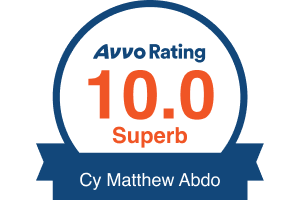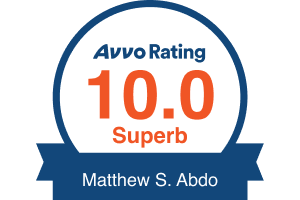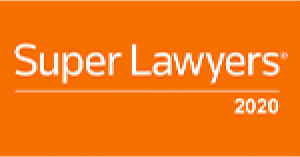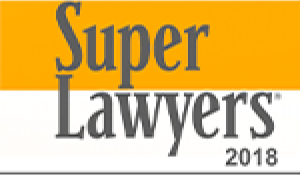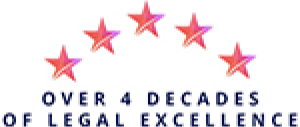Trials
Trial by Jury, Trial by Judge, Jury Selection Process
Not every criminal case goes to trial. According to a recent article, more than 90% of criminal cases are resolved by a plea without trial. This particular ABDO LAW website page is dedicated to those cases that are not resolved during the pretrial trial process and are scheduled for a trial before a jury or judge without a jury.
The accused in a criminal case has a right to a trial by a jury pursuant to the 6th Amendment of the U.S. Constitution. In some cases, the accused may opt to waive trial by jury and have the case tried before the judge. A trial that is held before a judge, acting without a jury, is called a “bench trial” or “waiver trial”. However, either the prosecutor or judge may also request a trial by jury and defeat an attempt by the accused to waive a jury. The reasons vary whenever a judge or prosecutor favor a jury trial. For example, the assigned judge may want to defer to a jury, and thus avoid rendering a verdict himself, when a case has local public policy implications or media exposure.
In What Circumstances Would a Defendant Waive a Jury Trial in Favor a Bench Trial?
There is no fixed formula for waiving a jury trial in favor of a bench trial and visa versa. ABDO LAW has handled both bench and jury trials. One or more of the following factors could influence our firm’s decision to seek a bench trial:
- When a jury might unduly penalize a defendant for not testifying at trial.
- When a jury might be unduly influenced by their emotions and biases rather than the evidence.
- When the defendant’s prior record may cause a jury to ignore exculpatory evidence.
- When there is insufficient evidence and a bench trial can occur without the formalities of a jury trial.
In certain cases such as domestic violence and assault which involve only the testimony of the defendant and victim (“he said, she said”) and it is unlikely that the court can find the defendant guilty beyond a reasonable doubt.
Trial by Jury
The first phase of the criminal jury trial involves the selection of a jury. Prior to the trial, jurors are required to return questionnaires to the court clerk. The questionnaires cover the potential juror’s background and the attorneys are entitled to examine the questionnaires. The questionnaires may reveal positive or negative characteristics of the potential juror. The questionnaires, issues at trial (such as self-defense) and other factors (police witnesses) provide a basis for an attorney to formulate tactical questions which may be asked during the jury selection process. Attorneys may be required to submit their unique questions to the trial judge for approval. Each court may have its own policy regarding the jury selection process.
Both the defense attorney and prosecutor play a vital role in the jury selection process. In theory, the goal is to impanel a fair and impartial jury. In reality, each side is trying to find a jury favorable to his or her side. The process whereby each side gets to question the jurors is called “voir dire”. A juror may be eliminated based upon a “challenge for cause” such as bias or discrimination. Each side gets an unlimited amount of challenges for cause. Both sides may also eliminate a juror for no reason whatsoever which is called a “preemptory challenge”. Each side is given a limited amount of preemptory challenges.
Potential questions by ABDO LAW during the jury selection process: Do you agree with me 100% that the defendant is presumed innocent and that you must return a verdict of not guilty if the prosecutor has failed to meet the burden of proving guilty beyond a reasonable doubt? Do you promise to return a verdict of not guilty if the prosecutor fails to meet his burden of proof?
The Following Footnote Is Added by Abdo Law Regarding Preemptory Challenges
A preemptory challenge of a juror (elimination) does not require any reason. In a criminal case, only a limited number of preemptory challenges are permitted by each side which will depend upon the penalty involved:
Type of Offense – Number of Preemptory Challenges
- Misdemeanors – 3
- Felonies – 5
- Life Offenses – 12
A prudent defense lawyer exercises caution in the use of preemptory challenges based upon the theory that if you eliminate a juror, he or she may be randomly replaced by someone that is worse! Since there may not be a basis to eliminate the replaced juror for “cause”, another preemptory challenge may need to be exhausted resulting in the next random juror being worse than the eliminated juror, and so on. An extension of this notion is that an attorney should never utilize his or her last preemptory challenge unless it is absolutely necessary.
Jury Instructions
After the jury is selected, the judge gives several instructions to the jury according to the Michigan Criminal Jury Instructions. The most important of these instructions pertain to the burden of proof, presumption of innocence and right to remain silent. The jury is read these instructions as follows:
- A person accused of a crime is presumed innocent. This means that you start with the presumption that the defendant is innocent. This presumption continues throughout trial and entitles the defendant to a verdict of not guilty unless you are satisfied beyond a reasonable doubt that he/she is guilty.
- The defendant is not required to prove his innocence. If you find that the prosecutor has not proven each and every element of the crime beyond a reasonable doubt, then you must find the defendant not guilty.
- Every defendant has the absolute right not to testify. When you decide the case, you must not consider the fact that he/she did not testify. It must not affect your verdict in any way.
Know the risks: Taking a plea bargain or going to trial?
Not every law firm will tell you these things:
An attorney is not a fortune teller and cannot predict the outcome of a trial. A jury trial is not exact science and does not exist in the way that it is portrayed on television. Great lawyers lose trials. Lawyers with no experience win trials. When money is not an issue, a defendant may employ a jury consultant and handwriting analysis expert to assist with the jury selection process. Defendants that spend fortunes to fight a case lose trials. A lawyer is not necessarily a bad lawyer because he or she has a high percentage of losing trials. It may just mean that the lawyer takes on the tougher cases. A lawyer that wins more trials than he or she loses may mean that the lawyer just looks for cases to try that have favorable scenarios.
There has never been a trial where the lawyer or the client hasn’t agonized about some of these things, and others, either before or after a trial:
- Should the defendant testify at trial or remain silent?
- Did we get the right jury or should one or more of the jurors been eliminated?
- Would it have helped to call a witness that was not called to testify?
- Would it have helped if we did not call a certain witness to testify?
- Would it have helped if we asked a certain question or questions?
- Would it have helped if we didn’t ask a certain question or questions?
- Should the defendant have accepted the plea bargain?
Going to trial has risks. Taking a plea means that the defendant will never know how the case would have played out at trial. ABDO LAW will explain both sides. In the end, our clients make the ultimate decision.














